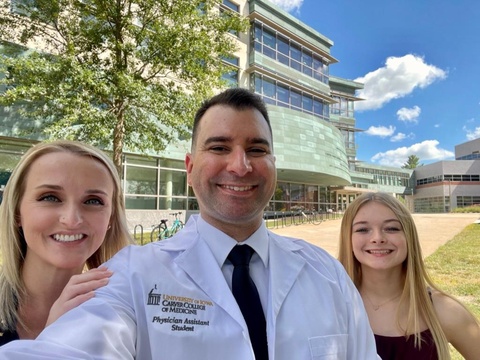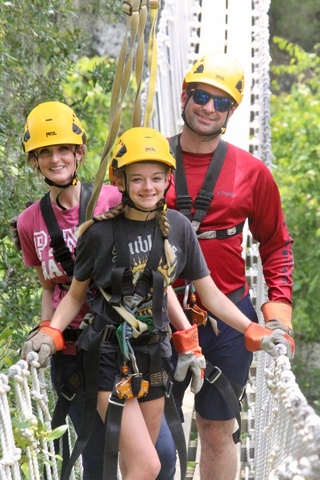Interview conducted in February 2024. Some answers reflect John Hanshew's experience specific to that time period.

You recently completed your didactic training and are early in your clinical training. How have your clinical rotations been for you?
They’ve been outstanding. My first rotation was with the inpatient cardiology consult team here. Some of the consults were very high-level, and I was overwhelmed for the first couple of days, but I settled in and learned a ton about guideline-directed medical therapy, structural heart disease, and more advanced interpretation of echocardiograms and EKGs. Now, I’m in Storm Lake in family medicine, and it’s a different universe. We’ve seen more patients in the first four days of this rotation than I did the entire month in cardiology. It’s quite rural, and we see anything and everything, which is perfect for learning: a ton of repetition evaluating and treating common issues with a decent number of less common patient concerns and procedures mixed in.
You earned a bachelor's degree in history in 2006, worked as a firefighter and paramedic for several years, earned a bachelor's degree in biomedical sciences in 2021, and then entered PA school in 2022. What has this nontraditional route taught you?
That I really need to make up my mind? Honestly, it taught me a bit about so many different and seemingly disparate areas of life that I’ve found it to be an incredible asset when it comes to making connections with all sorts of different folks. Medicine is just easier when you have something in common with a patient, so being able to talk about fishing or diesel motors or Paw Patrol with kids (Marshall the fire dog is clearly the best!) or the Christianization of Roman literature or why Jean Lannes was the most capable of Napoleon's Marshals, or some other random nonsense, just helps to grow trust and show patients that you’re a person just like them.
What advice would you offer a PA student early in their didactic training?
I think I would tell them that it is imperative to truly understand the conceptual framework surrounding what is being discussed because there is so much deductive reasoning that takes place in clinic. Having a deep understanding of the schema for how each organ system functions and fails is so much more important than memorizing factoids about specific diseases. They're nice to know, but atypical presentations are exceptionally difficult to work through if you only memorized a list of facts about a disease process and don’t understand the underlying physiology and pathophysiology.
What have you learned about yourself in PA school that you didn’t know before?

One nice thing about entering the PA profession later in life is that I am, on some level, established as a person. I’ve attained some degree of accomplishment and gone through enough adversity to know exactly who I am and what I’m about. So, I haven’t really learned anything new, per se, but this has been an opportunity to test, temper, and refine what's already there.
You and your wife, Jenna, are raising your 16-year-old daughter. What’s it like to be both a full-time PA student and a father of a teenager?
It’s the most rewarding thing in my life, utterly terrifying (she’s learning to drive), sometimes infuriating, and often hysterically funny. Devoting so much time to school has been hard on the whole family, but I hope she sees the work and perseverance necessary to be successful and learns from the sacrifices we’ve made to get this far.